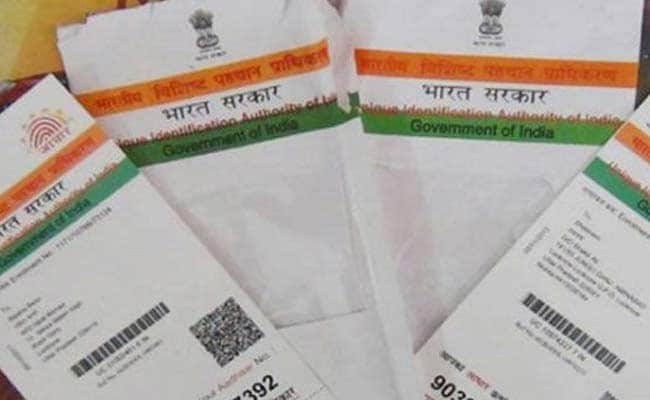
Mukul Rohatgi pitched linking Aadhaar with PAN as an attempt to fight terrorism and black money
New Delhi:
Defending the government's move to make it mandatory to link Aadhaar numbers to the PAN card issued by income tax authorities, the Centre told the Supreme Court on Tuesday that concerns over intrusion of citizens' privacy due to use of Aadhaar were "bogus". Attorney General Mukul Rohatgi also pitched linking Aadhaar number with PAN card, or permanent account number card, as an attempt to fight terrorism and black money.
"It (Aadhaar) is an effective tool to check terror financing and black money. It ensures that money meant for poor people reaches them...The idea is that burden on honest people who pay tax should not be made unbearable for them," Mr Rohatgi told the top court's bench of Justices AK Sikri and Ashok Bhushan.
The court is hearing three petitions challenging the constitutional validity of a change in law made during parliament's budget session that mandates people to link their Aadhaar number with the PAN card.
The Centre's top law officer suggested that too much was being made of the government collecting biometrics for Aadhaar. He said photographs and finger prints were collected earlier too, say for passports, but the difference was that this time, it was not on paper but in an electronic medium. He argued that the government was entitled to have details about a person's identity if it was providing some facility.
"The arguments on so-called privacy and bodily intrusion are bogus," he said, adding, "one cannot have an absolute right over his or her body".
"Can the petitioners today say that they do not have any mobile phone, credit card, driving licence, passport or other identification and they live in the Himalayas," he said.
To this, the bench, which would continue hearing arguments in the matter tomorrow, said, "Here, it is not about social welfare scheme. It is about income tax."
Two years back, the Centre had responded to concerns around invasion of privacy due to Aadhaar, arguing that there were conflicting judicial verdicts if privacy was indeed a fundamental right. The Supreme Court had decided to refer this point to a constitutional bench but ordered the government for very selective purposes.
In 2016, the Centre pushed a law through parliament to give itself the power to make Aadhaar mandatory. This law was classified as a money bill, which implied that the Lok Sabha, where the ruling alliance has the majority, can reject changes made by the Rajya Sabha.
"It (Aadhaar) is an effective tool to check terror financing and black money. It ensures that money meant for poor people reaches them...The idea is that burden on honest people who pay tax should not be made unbearable for them," Mr Rohatgi told the top court's bench of Justices AK Sikri and Ashok Bhushan.
The court is hearing three petitions challenging the constitutional validity of a change in law made during parliament's budget session that mandates people to link their Aadhaar number with the PAN card.
The Centre's top law officer suggested that too much was being made of the government collecting biometrics for Aadhaar. He said photographs and finger prints were collected earlier too, say for passports, but the difference was that this time, it was not on paper but in an electronic medium. He argued that the government was entitled to have details about a person's identity if it was providing some facility.
"The arguments on so-called privacy and bodily intrusion are bogus," he said, adding, "one cannot have an absolute right over his or her body".
"Can the petitioners today say that they do not have any mobile phone, credit card, driving licence, passport or other identification and they live in the Himalayas," he said.
To this, the bench, which would continue hearing arguments in the matter tomorrow, said, "Here, it is not about social welfare scheme. It is about income tax."
Two years back, the Centre had responded to concerns around invasion of privacy due to Aadhaar, arguing that there were conflicting judicial verdicts if privacy was indeed a fundamental right. The Supreme Court had decided to refer this point to a constitutional bench but ordered the government for very selective purposes.
In 2016, the Centre pushed a law through parliament to give itself the power to make Aadhaar mandatory. This law was classified as a money bill, which implied that the Lok Sabha, where the ruling alliance has the majority, can reject changes made by the Rajya Sabha.
Track Latest News Live on NDTV.com and get news updates from India and around the world

